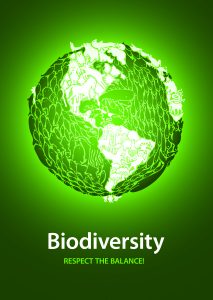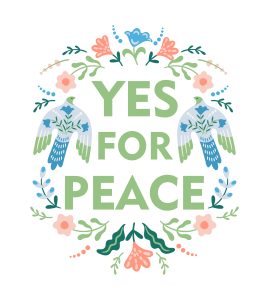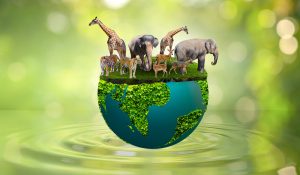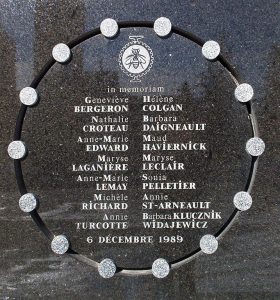A historic deal was reached at the UN Biodiversity Summit (COP15) on Monday, December 19 when 195 countries adopted the Kunming-Montreal Global Biodiversity Framework.
 The aim of this global pact is to halt and reverse the rapid loss of biodiversity by 2030, setting aside at least 30% of the world’s lands, oceans and inland waters for conservation and respecting the rights, roles and contributions of indigenous peoples toward this goal. The Framework designed at COP15 charts a new way forward, a path away from the damaging patterns that led to the destructionof ecosystems and diminishment of species over many decades. Attached is a segment of an article by Brian Roewe, an environmental correspondent with the National Catholic Reporter, on the presence and influence of faith groups at COP15.
The aim of this global pact is to halt and reverse the rapid loss of biodiversity by 2030, setting aside at least 30% of the world’s lands, oceans and inland waters for conservation and respecting the rights, roles and contributions of indigenous peoples toward this goal. The Framework designed at COP15 charts a new way forward, a path away from the damaging patterns that led to the destructionof ecosystems and diminishment of species over many decades. Attached is a segment of an article by Brian Roewe, an environmental correspondent with the National Catholic Reporter, on the presence and influence of faith groups at COP15.
El lunes 19 de diciembre se alcanzó un acuerdo histórico en la Cumbre de las Naciones Unidas sobre Biodiversidad (COP15), cuando 195 países adoptaron el Marco Mundial para la Biodiversidad de Kunming-Montreal.
El objetivo de este pacto mundial es detener e invertir la rápida pérdida de biodiversidad para 2030, reservando al menos el 30% de las tierras, océanos y aguas continentales del mundo para su conservación y respetando los derechos, funciones y contribuciones de los pueblos indígenas hacia este objetivo. El Marco diseñado en la COP15 traza un nuevo camino a seguir, un camino que se aleja de los patrones perjudiciales que condujeron a la destrucción de los ecosistemas y a la disminución de las especies durante muchas décadas. Se adjunta un fragmento de un artículo de Brian Roewe, corresponsal medioambiental del National Catholic Reporter, sobre la presencia y la influencia de los grupos religiosos en la COP15.


 The COP talks are an effort to get countries to agree to policies that will halt and repair the damage and destruction caused by human activities like mining on the planet’s ecosystem and wild species. Over the course of the talks, attention has been focused on preserving 30% of the world’s land and water by 2030. But this depends on the technology and the finances available, and no deal can happen, however worthy and necessary, unless there are adequate resources. Several complex issues are at play in the negotiations – including the questions of how much territory countries are willing to leave undeveloped for the conservation of natural habitats and how to finance that effort. While there was agreement that countries which have great biodiversity, but which also need to develop their economies should not be the ones to carry the burden for the rest of the world, no significant progress has been made in resolving that critical issue.
The COP talks are an effort to get countries to agree to policies that will halt and repair the damage and destruction caused by human activities like mining on the planet’s ecosystem and wild species. Over the course of the talks, attention has been focused on preserving 30% of the world’s land and water by 2030. But this depends on the technology and the finances available, and no deal can happen, however worthy and necessary, unless there are adequate resources. Several complex issues are at play in the negotiations – including the questions of how much territory countries are willing to leave undeveloped for the conservation of natural habitats and how to finance that effort. While there was agreement that countries which have great biodiversity, but which also need to develop their economies should not be the ones to carry the burden for the rest of the world, no significant progress has been made in resolving that critical issue. What then is being asked of us? First of all, to let our hearts be changed by our experience of the [pandemic] crisis, to let God, at this time in history, transform our customary criteria for viewing the world around us. We can no longer think exclusively of carving out space for our personal or national interests; instead, we must think in terms of the common good, recognizing that we belong to a greater community, and opening our minds and hearts to universal human fraternity. We cannot continue to focus simply on preserving ourselves; rather, the time has come for all of us to endeavour to heal our society and our planet, to lay the foundations for a more just and peaceful world, and to commit ourselves seriously to pursuing a good that is truly common.
What then is being asked of us? First of all, to let our hearts be changed by our experience of the [pandemic] crisis, to let God, at this time in history, transform our customary criteria for viewing the world around us. We can no longer think exclusively of carving out space for our personal or national interests; instead, we must think in terms of the common good, recognizing that we belong to a greater community, and opening our minds and hearts to universal human fraternity. We cannot continue to focus simply on preserving ourselves; rather, the time has come for all of us to endeavour to heal our society and our planet, to lay the foundations for a more just and peaceful world, and to commit ourselves seriously to pursuing a good that is truly common.
 Participants will set out new goals and develop an action plan for nature over the next decade. The conference will be held in Montréal, Quebec, the seat of the UN CBD Secretariat, from December 7 – 19, 2022.
Participants will set out new goals and develop an action plan for nature over the next decade. The conference will be held in Montréal, Quebec, the seat of the UN CBD Secretariat, from December 7 – 19, 2022.
